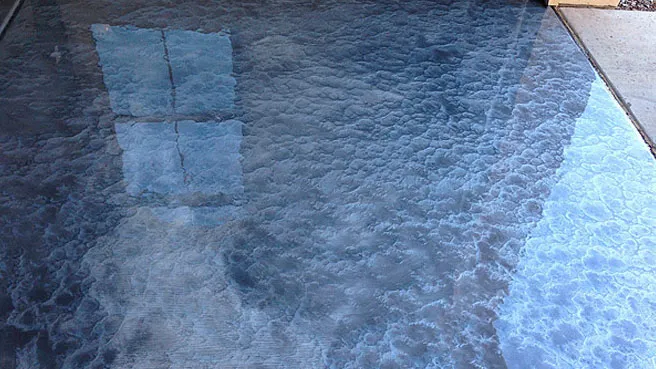- Coeur d'Alaene
- [email protected]

Do you need new floors for your Coeur d'Alene business or home? Are you considering epoxy floor coatings? Epoxy is an excellent choice for many flooring projects, but there are a few things you should know before making your decision.
This article will discuss everything you should know about epoxy floor coatings, including what epoxy is, where it is typically installed, and the different types of epoxy coatings. We'll also discuss the importance of professional installation and the risks of DIY epoxy projects.
Epoxy is a type of resin used in many different applications, including flooring. Epoxy resins are made from a combination of two materials: a polymer and a hardener. When these two materials are mixed together, they create a tough, durable material that can be used for a variety of purposes.
Epoxy flooring is made by mixing epoxy resin with a colorant and a filler material, then spreading it over the floor and allowing it to harden. Once the epoxy has hardened, it forms a strong, seamless surface that is resistant to wear and tear.
Epoxy flooring is most commonly installed in commercial and industrial settings, but it can also be used in residential applications. It is often used in garages, warehouses, showrooms, factories, and other high-traffic areas where durability and easy maintenance are important.
The most common installation areas include:
There are two main types of epoxy floor coatings: solid and flake. Solid epoxy coatings are made from 100% epoxy resin, while flake epoxy coatings contain small flakes of color or other materials suspended in the epoxy.
Solid epoxy is the most common type of epoxy flooring, and it is often used in industrial and commercial applications. Flake epoxy is less common, but it can be used to create a unique, decorative finish.
This type of epoxy is made with water-based resins and is typically used in residential applications. Water-based epoxy is easier to apply and clean up than other types of epoxy, and it has a low odor. However, it is not as durable as other types of epoxy, and it is not recommended for high-traffic areas.
Solvent-based epoxy is made with chemical solvents and is often used in industrial settings. This type of epoxy is more durable than water-based epoxy, but it has a strong odor and can be difficult to apply.
High solids epoxy is a type of solvent-based epoxy that contains a higher percentage of solids, which makes it more durable. This type of epoxy is often used in commercial kitchens and other high-traffic areas.
Ultra-high solids epoxy is the most durable type of epoxy flooring. It contains a higher percentage of solids than other types of epoxy, and it is often used in industrial settings.
Vapor barrier epoxy is a type of epoxy that contains a vapor barrier. This type of epoxy is often used in commercial kitchens and other areas where there is a risk of water damage.
Flake epoxy is a type of epoxy that contains small flakes of color or other materials suspended in the epoxy. This type of epoxy is less common than solid epoxy, but it can be used to create a unique, decorative finish.
Metallic epoxy is a type of epoxy that contains metallic pigments. This type of epoxy is often used to create a decorative finish, and it can be used in both commercial and residential applications.
There are many benefits to installing epoxy flooring, including:
-Durability: Epoxy floors are very strong and resistant to wear and tear. They can withstand heavy traffic and the weight of vehicles, making them ideal for garages and warehouses.
-Easy maintenance: Epoxy floors are easy to clean and maintain. They are stain-resistant and do not require waxing or polishing.
-Safety: Epoxy floors are slip-resistant and have a low-profile surface that can help prevent trip and fall accidents.
-Decorative options: Epoxy floors can be customized with a variety of colors and finishes to create a unique look.
Risks of DIY Epoxy Flooring Projects
While epoxy flooring is a relatively simple DIY project, there are some risks involved. If the epoxy is not mixed properly, it will not harden correctly and will not bond to the floor. This can lead to a messy, uneven finish that is difficult to repair.
Another risk is overspreading the epoxy. If too much epoxy is used, it will take longer to cure and could result in bubbles or other imperfections in the finished surface. It is important to follow the manufacturer's instructions carefully to avoid these problems.
While epoxy flooring is a relatively simple DIY project, it is important to hire a professional installer if you want the best results. Professional installers have the experience and equipment needed to mix and apply the epoxy properly. They will also be able to ensure that the finished surface is level and free of imperfections.
Hiring a professional installer is especially important if you are installing epoxy in a commercial or industrial setting. In these applications, it is critical to have a durable, seamless floor that can withstand heavy traffic.
If you are considering epoxy flooring for your home or business, contact a local flooring contractor to discuss your options. They will be able to advise you on the best type of epoxy flooring for your needs and budget.

Coeur D'Alene Epoxy Flooring is the only qualified and professional epoxy flooring company in all of Coeur D'Alene. Help support your local flooring company and give us a call today for a free no obligation quote!~
© Copyright 2021. Epoxy Flooring. All Rights Reserved